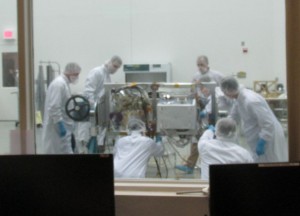Dr. Alex Werth gave an invited colloquium lecture to space scientists at NASA-Goddard Space Flight Center in Greenbelt Maryland on evolutionary rates—how quickly or slowly do species evolve, and why?—and the resulting consequences for exobiology (extraterrestrial life). The lecture was spurred by the article Prof. Werth recently published with Prof. Bill Shear in American Scientist on “living fossils.” If life exists within reach of Earth-based probes—for example, on the watery moons of Jupiter and Saturn—would it evolve by the same mechanisms as life on our planet? What are the problems of studying species over long periods of time, and how might this affect our study of potential life on other worlds? The lecture gave Prof. Werth an opportunity to observe facilities for constructing and testing space probes, as well as to visit with two former Hampden-Sydney astronomy professors (Dr. Hans Krimm and Dr. Don Kniffen, both at H-SC in the 1990s) and their families.
Biology Department
individually tailored preparation for graduate and professional work

